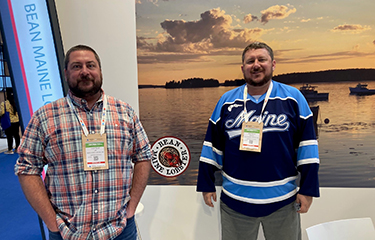The Bean family name is nearly as synonymous with the U.S. state of Maine as lobster.
In 2007, Linda Bean – the granddaughter of the founder of the L.L. Bean company – splashed into the lobster business, spending several million dollars to buy and upgrade four wharves and a processing plant along the Maine coast. Bean bet on the idea that she could make her own name brand for lobster as iconic as the Perdue name is to chicken.
By 2009, Bean was buying as much as 5 percent of all lobster landed in Maine, and had a plan to open 100 franchised Linda Bean’s Perfect Maine Lobster Roll chain restaurants. She even hatched a plan to rename lobster claws “cuddlers” because “like chicken tenders, it tells you you’re eating something succulent, not scary,” she told The New York Times.
Bean’s vision to transform lobster from a luxury item to a widely available commodity found some success, including a distribution deal with Walmart for the company’s frozen cooked “cuddlers” and another with Delaware North, a foodservice provider to sports venues.
However, Bean’s foray into the lobster business was not without controversy. She pushed for the eventual Marine Stewardship Council certification of the fishery – which was suspended in 2022 due to the fishery’s alleged threat to North Atlantic right whales – and her effort to commoditize lobster was not universally well-received. Her company’s processing plant was picketed by People for the Ethical Treatment of Animals after employees were filmed tearing limbs off live lobsters, and in 2014, it faced a citation from the U.S. Food and Drug Administration for a number of food safety violations. And her outspoken political views created a polarized view of her in the state and nationally.
In 2016, Bean decided to sell her lobster company – based in Rockland, Maine – to her employees. To qualify to join the ownership plan, an employee must work at the company for at least a year. There are currently 30 employee-owners, according to Bean Maine Lobster Vice President Dan Falla. Bean is no longer involved in the management of the company, according to Falla, but two of her closely held goals for the company have been retained – sourcing from Maine only, and not sacrificing quality for expedience.
"Everyone knows that when they buy something from us, it's fresh, because we only buy from our supply. We're not buying somebody else’s lobster who might have been holding that product for a month. And all our lobster is from Maine, no Canadian product,” Falla said. “We have control over our lobster from the moment it leaves the ocean to the moment our customers receive it. And because we’re employee-owned, every lobster is packed with care, because every one of us has skin in the game. The guys who are packing the lobsters are our owners, and they know the better we do, the happier our customers are, the more profit they make.”
Falla acknowledged it isn’t the easiest way to make a living in the lobster business, as many rivals trade on volume and use subsidized Canadian processing operations and Canadian product when lobster is out of season in Maine, while still capitalizing on Maine’s strong lobster name-brand.
“It’s a hard thing for us, actually, because when lobsters get tight, which they are in Maine right now, everyone else can buy those lobsters coming down from Canada. They’ve created their own infrastructure in Canada and bypass the U.S. whenever they can. [Spring] is not our favorite time of year,” Falla said.
Falla said the company’s salespeople, including his cousin Ben Falla, have to engage in a bit of matchmaking to find clients okay with the company’s self-imposed limitations.
“We're upfront with people right off the bat and say this is what it is. Sometimes we won't be able supply you. For people who need lobster year-round, we can't be your only supplier,” Ben Falla told SeafoodSource. “There’s enough market out there for everyone; We just want a slice of it, we just want to grow slowly and do well by our employee-owners.”
Both Fallas declined to say how far along the repurchasing process is, but they praised Linda Bean for ensuring the company remained U.S.-owned.
“A lot of companies in the lobster business have ended up selling out. Generational companies are selling out to China or Canadian companies. [Linda Bean] felt the best way to do it was to sell it to the employees,” Ben Falla said.
At the 2023 Seafood Expo Global in Barcelona, Spain, in April, the Fallas were …
Photo by Cliff White/SeafoodSource








